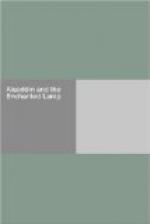[FN#397] Wesikh. Burton, “fulsome.”
[FN#398] Night DLIII.
[FN#399] Diri balek an [la]. Burton, “compose thy thoughts. If, etc.” See ante, passim.
[FN#400] Sic.
[FN#401] Kedhebaka.
[FN#402] i.e. that which he derived from such an alliance.
[FN#403] Lit. “Wretches” (mesakin).
[FN#404] Night DLIV.
[FN#405] Inketaet (lit. “she was cut or broken”) min el khauf. Burton, “She was freed from her fear of the past.”
[FN#406] Or “honoured” (azlz)
[FN#407] i.e. “in my behaviour to thee.”
[FN#408] Kema akedu min mehebbetika li. Burton, “even as I claim of thee affection for thy child.”
[FN#409] Night DLV.
[FN#410] Hhashaha min el kidhb; lit. “Except her from lying!” Hhasha (which commonly signifies, “Far be it,” “God forbid!”) is here used in a somewhat unusual manner. The sense seems to be, “God forbid that the Lady Bedrulbudour should be suspected of lying! "
[FN#411] Or “shrunken” (kusziret). Burton, “bursten.”
[FN#412] Or “honoured” (aziz).
[FN#413] Night DLVI.
[FN#414] Lit. “how [was] the device therein;” i.e how he should do for an expedient thereanent. Burton, “the device whereby he should manage it.”
[FN#415] Or “called upon” (nedeh).
[FN#416] El ashreh [mubeshshereh understood], “the ten [who were rejoiced with glad tidings],” i.e. ten of Mohammed’s companions (Abou Bekr, Omar, Othman, Ali, Telheh, Zubeir, Saad ibn Abi Weccas, Abdurrehman ibn Auf, Abou Ubeideh ibnu’l Jerrah and Said ibn Zeid), to whom (and to whom alone) he is said to have promised certain entrance into Paradise. They are accordingly considered to have pre-eminence over the Prophet’s other disciples and are consequently often invoked by the less orthodox Muslims as intercessors with him, much after the fashion of the Quatuordecim Adjutores, the Fourteen Helpers [in time of need], (i.e. Saints Catherine, Margaret, Barbara, Pantaleon, Vitus, Eustace, Blase, Gregory, Nicholas, Erasmus, Giles, George, Leonard and Christopher) of Romish hagiology.
[FN#417] i.e the marriage of his son to the Sultan’s daughter. Burton, “it having been a rare enjoyment to him that he had fallen upon such high good fortune.”
[FN#418] Lit. “marriage,” i.e. “wedding festivities are out of place.” The word (zijeh) here used is a dialectic (Syrian) variant of zewaj, marriage. Burton, “we require no delay,”
[FN#419] Lit. “the lord (i.e. he) of the suit or claim” (sahibu ’d dewat).
[FN#420] Or “inestimable,” lit. “might not be measured by (or appraised at) a price or value.” Burton, “far beyond his power to pay the price.”
[FN#421] Lit. “How is the management or contrivance (tedbir) with thee?” i.e. “canst thou suggest to us any expedient?”




